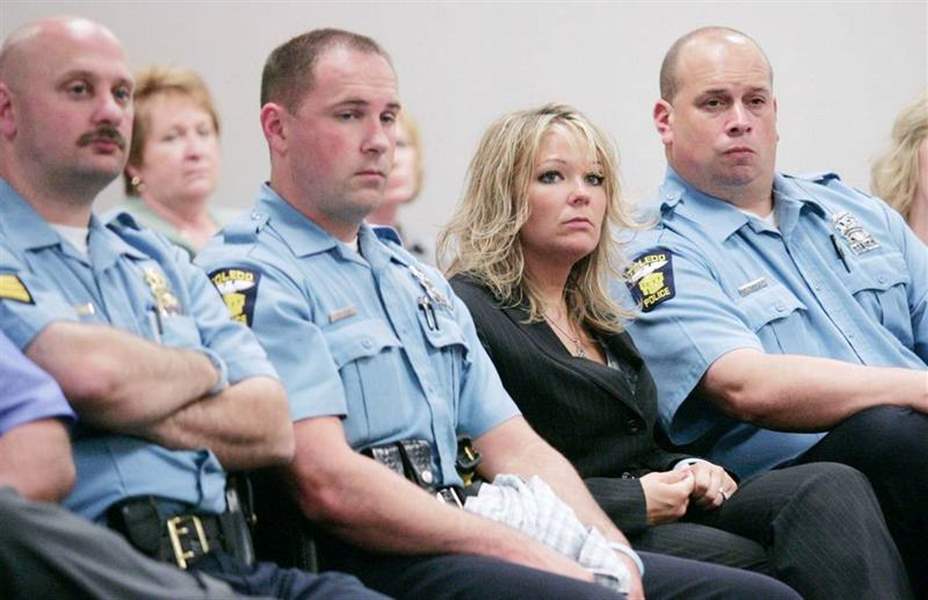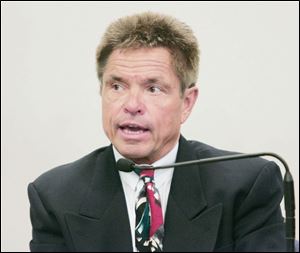
Jobe cleaned his gun after killing, court told; hearing recessed until Monday
6/8/2007
Danielle Dressel, widow of Detective Keith Dressel, joins offi cers at the hearing for the teen accused of killing her husband.
In the hours after 15-year-old Robert Jobe shot and killed a Toledo police detective, he went to a friend s house and cleaned his gun with alcohol, according to testimony today in Lucas County Juvenile Court.
That, according to a clinical psychologist, is the kind of sophisticated criminal behavior that shows the juvenile justice system doesn t have enough time before Jobe s 21st birthday to rehabilitate him.
In terms of adolescent development, he was pretty calm and cool, in being able to do all that after this highly-emotional shooting, said Dr. David Connell, an expert witness called by prosecutors who are trying to have the teen stand trial as an adult for the shooting death of vice narcotics Detective Keith Dressel.
Later on the day of the murder, as Robert Jobe talked to investigators in the downtown police station, the teen seemed equally unfazed by the shooting.
He was eating chips, drinking water, smoking cigarettes He was wasn t acting like a scared little kid brought in for police questioning, Mr. Connell said.

Danielle Dressel, widow of Detective Keith Dressel, joins offi cers at the hearing for the teen accused of killing her husband.
The testimony came in the fourth day of hearings in front of retired Lucas County Juvenile Court Judge James Ray, who must decide whether the teen should be tried as an adult or a juvenile in the case.
Young Jobe has admitted to police that he shot Detective Dressel Feb. 21, but said it was an accident as the two struggled.
If he is tried and found delinquent as a juvenile, he would most likely be released on his 21st birthday. A conviction in adult court could put him behind bars for the rest of his life.
Judge Ray had said he would decide by 4 p.m. today, but as testimony from Mr. Connell and an expert witness for the defense stretched toward that deadline, he called for a recess until 8:30 a.m. Monday.
Also today, Wayne Graves, a psychologist called by the defense, cautioned against Mr. Connell s conclusion that the teenager exhibited characteristics similar to those of an adult psychopath.

Dr. Thomas Sherman described the accused teen as a regular, adolescent boy who was easily manipulated.
Some symptoms impulsivity or an apparent lack of empathy, for example could fit many teenagers, he said. Additionally, research on adult psychopathy doesn t always translate to adolescents, who are still developing.
The defendant, whom he called Bobby, seemed to have been emotional, immature, and still able to change, he said.
Like testimony from another expert witness Thursday, he referred to a police video clip in which young Jobe weeps in an interrogation room after investigators stepped out and his mother stepped in.
The psychologist said the episode showed both shame and fear.
What I observed was Bobby breaking down, frightened, clinging to his mother, berating himself for what he d done and for having become like his dad, Mr. Graves said.
His late father, Clarence Jobe, spent years in prison for a string of offenses ranging from rape to kidnapping to robbery.
Both psychologists acknowledged there are no guarantees to their predictions about whether the teenager would re-offend if he is released.
In a courtroom yesterday, nearly four months after young Jobe cried in a police interrogation room, attorneys and witnesses on both sides of the case tried to interpret his tears: Was he a remorseful teen who realized he had killed a police detective and devastated a family? Or a self-centered murderer who realized he could spend his life behind bars?
Robert appeared to be a young man [who] was quite older than he was, said Kermit Quinn, one of two detectives who interviewed the Jobe youth after the shooting death of Detective Dressel. He was street hard to me. He knew the game.
The teen, the detective continued, had first denied he had a gun in the early morning hours of the murder, then claimed the shooting was an accident.
He could look us straight in the eye and tell us an outright lie, Detective Quinn testified.
But by the end of the day, a veteran psychiatrist had suggested a different Robert Jobe that of an immature and easily manipulated little boy who had simply reacted to the situation around him the night of the murder. The youth was not, he said, a psychopath.
This was like interviewing a regular adolescent boy, said Dr. Thomas Sherman, medical director of the Lucas County Court Diagnostic and Treatment Center.
The detective was shot during a struggle about 2 a.m. Feb. 21 after he and two partners came upon what they suspected was a drug deal by two people, later identified as Jobe and Sherman Powell, 19. Mr. Powell faces drug charges in Lucas County Common Pleas Court.
Videotaped pieces of the teenager s statement to police punctuated yesterday s hearing, allowing the public to hear for the first time the suspect s description of the night Detective Dressel died.
In the video, the teen told investigators he had run from Detective Dressel and slipped on a patch of ice. As the two struggled, the teen had his hands on a gun inside his pocket, then heard a single shot.
I heard the officer. He was like ugh! Then I was running across the road and I heard gunshots after me, he said in the video.
Detective Quinn, in the video, asked him why. The teen responded: I was trying to be grown.
A gun, the detective retorted, don t make you a man.
With his own voice streaming from the court s audio system, the teen sat motionless between his mother, Diane, and his defense attorney, Ann Baronas. A few yards behind him, Detective Dressel s wife, Danielle, sat between officers, their hands often holding hers.
Detective Quinn s testimony followed that of several other officers who recalled arresting Jobe for drugs, for struggling with them, and once for having a 22-caliber handgun in the months before the shooting.
But it was Dr. Sherman s testimony that filled most of the Thursday afternoon session.
The doctor had evaluated the teen, on the court s request, to determine whether he is amenable to rehabilitation before his 21st birthday.
Dr. Sherman has done more than 100 such evaluations on serious offenders, he said, and more than half the time, he recommends the defendants be certified to stand trial as adults.
But in the latest case, he said, he found no indication of psychopathy in the suspect. He said a psychopath would have no ability to empathize, to make bonds with others, and most importantly to be unable to change or be rehabilitated.
Rather he described a teen who had idealized his dead father, had been teased by classmates, and who had been influenced by young adults whose normal routine included drugs and guns.
He noted that he d reviewed another portion of the video, one that wasn t played in court. In that excerpt, Diane Jobe walks into the interrogation room and the huge emotional impact on him is apparent, Dr. Sherman said.
Bobby breaks down and sobs, the psychiatrist said. You look and see a little boy.
His and other testimony also touched on something else: Was the teenager intoxicated at the time of the shooting?
Dr. Sherman said the teen had told him that he d taken an Ecstasy pill, which is an amphetamine, in the hours before the shooting and he tells detectives on the videotape that he had been drinking beer and other alcohol.
But a representative from Lucas County Centralized Drug Testing had earlier testified that the suspect s urine tests on Feb. 21 were negative for amphetamines.
When prosecutor Dean Mandros brought up the discrepancy, Dr. Sherman argued the teen could have mistaken another pill for Ecstasy.
Testimony will continue today with another expert witness for the defense before Judge Ray makes his decision.
Contact Robin Erb at: robinerb@theblade.com or 419-724-6133.